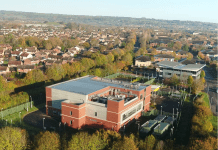Chris Tyerman, managing director for Infrastructure at Tilbury Douglas, discusses how a ‘modern method of construction’ approach to water projects delivers proven efficiencies and added value for all
Building on our previous relationship with Thames Water, we are now one of its key design and construction partners working on multiple projects in the Thames Valley region. As the UK’s largest water company, Thames Water serves 15m customers across Thames Valley and London every day, that’s a big task and one we want to support as effectively as possible, reducing any risk of interruption or disruption to that service is key.
We were appointed onto Lot 4 of the Thames Water Capital Delivery Framework in in October 2020. As part of this, we will be upgrading wastewater and clean water treatment facilities across the region helping Thames Water to deliver on its commitment to maintain high quality water and wastewater services.
We currently have in place contracts to deliver projects worth a total of circa £50m with the average individual project value being just under £5m. These are being delivered by an experienced specialist team including Production and Project Managers and Civil, Mechanical and Electrical Engineers.
We have integrated our design partner Arcadis into our team along with some strategic supply chain partners, allowing us to develop efficient design solutions in preparation for delivery utilising a digital and a ‘Modern Method of Construction’ (MMC) methodology wherever possible. The first batch of projects will be onsite from July 2022. In the meantime, we are also developing the next batch of future projects, exploring where possible, further efficiencies to generate the best possible outcomes in terms of sustainability, risk mitigation and of course, affordability.
Bringing MMC to life
A key factor in our approach to project delivery is our philosophy, which is to only build onsite if we cannot build offsite, we call this Production Line Thinking (PLT). This means we utilise MMC and offsite construction techniques alongside digital integration to deliver a range of benefits, including reducing health and safety risk, excellent quality control and assurance, and minimising potential disruption to Thames Water’s operations.
We develop a Manufacturing Plan at project inception so that our offsite build vision is baked into the design approach from the start, not as an afterthought looking for last minute value engineering savings. This means thinking innovatively in many ways, for instance, we have changed some of the key job titles – we now have Production Managers and Manufacturing Leads helping us to embed our PLT approach.
We identified during the tender period key strategic offsite manufacturing suppliers that can support us on this journey and engaged very early with them, allowing us to integrate them into our bid and be a part of our team from day one. This has really brought significant benefits both commercially and in terms of overall thinking. One of these is Bridges Electrical Ltd, which has a large offsite manufacturing facility just outside the Thames Valley region. We can already see how this strategic supplier approach, where we treat them as an extension to our own capabilities, will further drive future efficiencies and benefits.
By utilising PLT, we are putting the Construction Playbook principles into practice – designing and testing digitally and manufacturing offsite. This is an approach we have proven to be successful on other projects, such as the multi-award winning Wolsingham Sewage Treatment Works Growth Improvement project in the North East of England. This scheme delivered high quality facilities against a backdrop of the pandemic and materials shortage, with minimal impact to the site – further cementing that this solution offers reduced risk and overall best value.
Skills development
As part of our commitment to building a better future for all, we have a clear focus on developing and growing our capability in the areas which we operate. It is no surprise to anyone that the current skills shortage is a key issue across our industry and our work with Thames Water is no different.
This means we are investing in skills development and are committed to recruiting apprentices, we took on a new cohort to work on our Thames Framework in 2021. In 2022, we will double our intake and we plan to continue this annually to ensure we are developing skills for the future. We have established a dynamic, diverse, and highly experienced team on this framework and have a great opportunity to further enhance our capability with a minimum of 50 further locally based job opportunities at all levels across the team.
As we develop and engage with our local supply chain in the region, we will be seeking to develop further skills and progress opportunities – generating a real difference to anyone looking to work within this sector.
Integrated team working
Having just completed our first 18 months working on the Thames Water framework, whilst dealing with continued impact of COVID, we have proven that agile and hybrid working can be effective. Utilising the best available virtual tools that the team can access, has enabled effective meetings, collaborative planning sessions, as well as other meetings, to be undertaken in a safe and effective manner. Utilising this approach is providing us with flexibility and an ability to find further efficiencies in our PLT delivery approach.
Thames Water has certainly recognised the power of its teams coming together with collaboration driving efficiencies and performance. This is providing the platform that allows us to outperform into the future and continue to deliver on our promises to Thames Water and its commitments to its customers.
Chris Tyerman

Managing director for Infrastructure
Tilbury Douglas

















